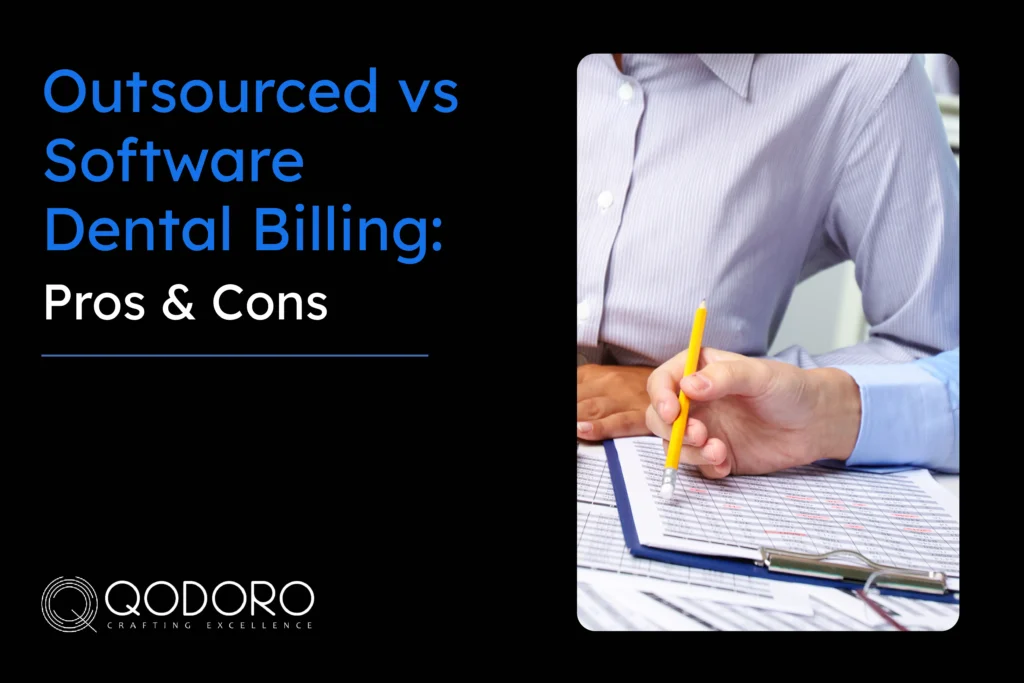
Published on: 18/06/2025

SHARE
Managing the revenue cycle in a dental practice isn’t just about numbers, it’s about patient care, efficiency, and long-term sustainability. With increasing claim denials, compliance complexities, and mounting administrative pressure, many practices face a critical decision: outsourced vs software-based dental billing which is right for your clinic?
There’s no one-size-fits-all answer. What works for a solo practice may not suit a multi-location dental group. That’s why understanding both options of outsourcing dental billing and using dental billing software is key to choosing the best fit for your practice’s current needs and future growth.
In this blog, we’ll break down each method, compare their pros and cons, and help you figure out what’s best for you.
When it comes to dental billing, most practices choose between two main options: using software or outsourcing the work.
With software, your in-house team handles billing tasks using a digital tool made for dental practices. It helps with things like checking insurance, submitting claims, tracking payments, and sending patient bills. Most of these tools are cloud-based, so your team can manage everything from one dashboard. Many also connect directly with your EHR system, keeping things smooth and organized.
Outsourcing, on the other hand, means you hand over these tasks to a professional billing company. They take care of everything: claim submissions, follow-ups, appeals, patient invoicing, and even financial reports. These companies have trained experts who know dental codes, insurance rules, and how to handle tricky claims. It’s like having your own billing department, without having to hire and train one.
Both options aim to make billing faster, easier, and less stressful. The right one for your practice depends on your team, workload, and goals.
When it comes to choosing between software-based billing and outsourcing dental billing, the decision isn’t always simple. Each option has its own strengths and a few challenges.
Using dental billing software gives you more control. You and your team can directly manage claims, track payments, and access patient billing data in real time. Many platforms also connect with your scheduling and treatment tools, which keeps everything in one place. If your staff is well-trained and your billing process is already running smoothly, this can work really well.
Plus, the cost is often predictable. You usually pay a one-time fee or a monthly subscription with no surprise charges. This can make budgeting easier for smaller or mid-sized practices.
But here’s the catch: you still have to handle everything yourself. If your team isn’t confident with billing codes or insurance rules, mistakes can happen. And those mistakes can lead to claim rejections or payment delays. As your practice grows, managing billing in-house might mean hiring more people, which adds to your expenses.
Now let’s look at outsourcing. When you outsource dental billing, a team of experts handles everything for you, submitting claims, following up, managing denials, and keeping track of payments. They know the ins and outs of dental insurance, which means fewer errors and faster payments.
This also takes a lot of pressure off your team. Your front desk staff can focus on welcoming patients and managing appointments, instead of chasing down unpaid claims. And if your practice is growing or opening new branches, outsourced billing can scale with you without needing to hire more people.
But giving control to someone else can feel uncomfortable at first. Even though most billing companies offer detailed reports and regular updates, you may not be able to see everything instantly like you can with your own software. Also, outsourcing usually comes with a recurring cost either a flat monthly fee or a percentage of your collections. While many practices find the investment worth it, it’s still something to think about.
So, what’s better? It really depends on your team, your budget, and how much control you want to keep. If you’ve got a strong in-house team and like managing things closely, software could be the way to go. But if you’re overwhelmed, struggling with billing errors, or planning to grow, outsourcing might just make life a lot easier
If your dental practice has an experienced and reliable in-house billing team, and you prefer to keep a close eye on how things are managed, then dental billing software might be the right fit for you. It gives you the ability to automate repetitive tasks while still keeping control of your financial systems and day-to-day billing operations.
For smaller practices with manageable patient loads, using software can also be more cost-effective, especially when outsourcing feels too expensive for the volume of work involved.
Another big plus is data ownership. If your practice places a high value on keeping patient information and billing data fully internal, a secure, HIPAA-compliant software solution can offer the kind of privacy and control you’re looking for.
It’s also a good option for teams that are comfortable staying up to date with billing rule changes and insurance policy updates, and who don’t mind taking on the responsibility of compliance themselves.
If your current staff is feeling overwhelmed or if you’ve been dealing with frequent billing errors and claim denials, it might be a good time to think about dental billing outsourcing. When you outsource, your team can shift their focus back to what really matters, delivering quality patient care while experienced professionals handle the complexities of billing behind the scenes.
Outsourcing is especially helpful if your practice is in a growth phase, whether you’re adding new providers, opening another location, or going through a transition like a merger or acquisition. It gives you access to skilled support without the need to hire and train additional in-house staff.
Another important advantage is compliance. As insurance regulations and payer policies continue to change, outsourced billing partners often have certified coders and auditors who stay on top of updates. They make sure your claims are submitted accurately and legally, reducing the risk of denials and delays.
You don’t always have to choose one or the other. Many dental practices today are going for a hybrid model combining software and outsourcing to make billing easier and more efficient.
In a hybrid setup, you can use billing software to handle the basics. Things like creating invoices, submitting simple claims, and tracking payments can be done in-house. This keeps your team involved and gives you full visibility into what’s happening with your finances.
At the same time, you can outsource the more time-consuming or complicated tasks. Follow-ups on denied claims, appeals, and checking insurance eligibility can be handled by a third-party billing team. These professionals know the ins and outs of insurance and can often get better results faster.
This approach gives you the best of both worlds. You keep control where you want it, and you get expert help where you need it most.
It’s also flexible. As your practice grows or your needs change, you can shift the balance between in-house and outsourced work without completely overhauling your system.
If you’re not ready to fully commit to one method, a hybrid model might be the smartest way to get started.
Choosing between outsourced vs software-based dental billing isn’t just a tech decision. It’s a strategic choice that affects your revenue, your patients, and your team’s workload.
If you like having control, have a trained billing team, and your billing volume is manageable, software might be the right fit.
But if you’re dealing with staff burnout, frequent claim denials, or growing faster than your team can handle, outsourcing might be the smarter move.
The good news? You don’t have to figure it out alone.
Because Qodoro is here.
No matter which way you’re learning software or outsourcing, we’re here to make it easier for you.
Let’s talk and see what works best for your practice.
Staffing agencies typically fill temporary or contract positions, while recruitment agencies often focus on permanent hires and executive search.
Yes! With hybrid work, skill shortages, and evolving job markets, staffing agencies bring speed, flexibility, and expertise to your hiring strategy.
Qodoro consistently ranks at the top for tech placements, from software engineers to data analysts and cloud architects.

